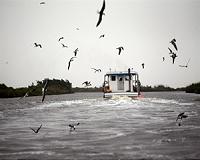| . |  |
. |
Nova Scotia, Canada (SPX) Jul 30, 2010 In an unprecedented effort that will be published online on the 28th of July by the international journal Nature, a team of scientists mapped and analyzed global biodiversity patterns for over 11,000 marine species ranging from tiny zooplankton to sharks and whales. The researchers found striking similarities among the distribution patterns, with temperature strongly linked to biodiversity for all thirteen groups studied. These results imply that future changes in ocean temperature, such as those due to climate change, may greatly affect the distribution of life in the sea. The scientists also found a high overlap between areas of high human impact and hotspots of marine diversity. Much research has been conducted on diversity patterns on land, but our knowledge of the distribution of marine life has been more limited. This has changed through the decade-long efforts of the Census of Marine Life, upon which the current paper builds. The authors synthesized global diversity patterns for major species groups including corals, fishes, whales, seals, sharks, mangroves, seagrasses, and zooplankton. In the process, the global diversity of all coastal fish species has been mapped for the first time. The researchers were interested in whether there are consistent "biodiversity hotspots" - areas of especially high numbers of species for many different types of marine organisms simultaneously. They found that the distribution of marine life showed two fundamental patterns: coastal species such as corals and coastal fishes tended to peak in diversity around Southeast Asia, whereas open-ocean creatures such as tunas and whales showed much broader hotspots across the mid-latitude oceans. The scientists also tested whether these global patterns could be consistently explained by one or more environmental factors. Temperature was the only factor found to be linked with the distribution of all species groups, with the availability of habitat also playing a role. Says lead author Derek Tittensor of Dalhousie University, "it was striking how consistently temperature was linked with marine diversity. This relationship suggests that ocean warming, such as that due to climate change, may rearrange the distribution of oceanic life." Co-author Walter Jetz of Yale University notes "while we are increasingly aware of global gradients in diversity and their associated environmental factors, our knowledge of patterns in the ocean has lagged behind that of patterns on land. Our study attempts to help overcome this disparity." The study also assessed the overlap between hotspots of marine diversity and human impacts, i.e. the combined effects of fishing, habitat alteration, climate change and pollution. Human impacts were found to be particularly concentrated in areas of high diversity, suggesting the potential for severe species losses in these regions. Says co-author Camilo Mora of Dalhousie University, "the combined effects of exploitation, habitat alteration, pollution and climate change are threatening the diversity of life in the global ocean. Our research provides further evidence that limiting ocean warming and other human impacts will be particularly important in securing these hotspots of marine biodiversity into the future." Co-author Boris Worm of Dalhousie University also highlights the need to maintain biodiversity in the face of these impacts: "biodiversity and the functioning of ecosystems are often tightly coupled, with highly diverse ecosystems providing more goods and services that benefit human beings, as well as being more resilient in the face of disturbance, than less diverse ecosystems. The observed concentration of human impacts in our richest marine areas is a worrying indication of our growing footprint in the oceans."
Share This Article With Planet Earth
Related Links Dalhousie University Water News - Science, Technology and Politics
 Concerns for local fishermen as Gulf focus shifts
Concerns for local fishermen as Gulf focus shiftsNew Orleans, Louisiana (AFP) July 29, 2010 US officials sought Thursday to reassure fishermen they will not lose out in the next phase of the Gulf of Mexico oil clean-up, while legal wranglings began for the BP trial of the decade. As final preparations were put in place for operations next week to permanently kill the well, US spill chief Thad Allen convened a meeting of parish presidents in New Orleans to discuss how best to safegu ... read more |
|
| The content herein, unless otherwise known to be public domain, are Copyright 1995-2010 - SpaceDaily. AFP and UPI Wire Stories are copyright Agence France-Presse and United Press International. ESA Portal Reports are copyright European Space Agency. All NASA sourced material is public domain. Additional copyrights may apply in whole or part to other bona fide parties. Advertising does not imply endorsement,agreement or approval of any opinions, statements or information provided by SpaceDaily on any Web page published or hosted by SpaceDaily. Privacy Statement |